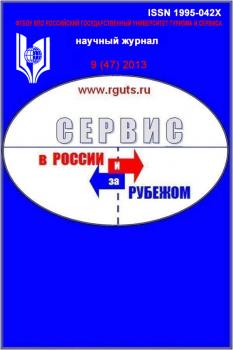Ussuriysk, Vladivostok, Russian Federation
In modern world, also in Russia, tourism is dynamic, independent branch of the economy. The tourism expands the boundaries of commercial offers and deepens specialization. Landscape, environment and space are the foundation for the tourism development. The potential of Russia's tourism industry, as one of the most important factors of regional development, is still underestimated. Many of landscape and cultural features remain unnoticed and unused. The tourism development in small cities is very important, since they have a valuable historical and cultural heritage, they are an important source of improving the welfare of the country. This territory can be represented as a system that opens great opportunities for knowledge about the history, culture, customs, spiritual and religious values of small cities in Russia. The article is dedicated to the regional features of tourism development in small historical cities of Russia. Nowadays the government has a great deal of attention to the development of tourism in the Russian Federation, in particular, the article discusses the federal programs that are currently being implemented. Many small cities have historical status now. The modern development of tourism in small historical cities was promoted by an increase of people's interest in their historical heritage, their past. This type of tourism is especially important for the preservation of the individuality of the peoples of the Russian Federation, their involvement in the world civilization. Creation in 2007 of the Association of Small Tourist Cities confirms this. The peculiarity of each of the cities is the perfectly preserved appearance of their historical part with a lot of unique monuments of architecture, history and culture. Some monuments are included in the UNESCO World Heritage List.
theme parks, image of the territory, structural organization, image, culture, principles of functioning, signs of territory, concept, entertainment industry, development of regions
1. Kudryavcev Yu.N., Harchenko A.V. Territorial'nyy marketing kak osnova strategii ustoychivogo razvitiya municipal'nyh obrazovaniy // Analiticheskiy vestnik. 2007. №4. S. 3-13.
2. Chernaya I.P. Marketing imidzha kak strategicheskoe napravlenie territorial'nogo marketinga // Marketing v Rossii i za rubezhom. 2002. №4. S. 15-21.
3. Krylov A.N. Osobennosti formirovaniya imidzha territoriy v rossiyskoy provincii // Sb. st. i mater. V Mezhdunar. nauch.-prakt. konf. «Problemy ustoychivogo razvitiya gorodov». Miass: OOO Agentstvo TERRA, 2008. T.1. S. 224-228.
4. Vedenin Yu.A. Dinamika territorial'nyh rekreacionnyh sistem. M.: Nauka, 1982. 190 s.
5. Vizgalov D.V. Marketing goroda. M.: Institut ekonomiki goroda, 2008. 110 s.
6. Kotler F., Asplund K., Reyn I., Hayder D. Marketing mest. Privlechenie investiciy, predpriyatiy, zhiteley i turistov v goroda, kommuny, regiony i strany Evropy. SPb.: Stokgol'mskaya shkola ekonomiki, 2005. 390 s.
7. Pankruhin A.P. Marketing territoriy. SPb.: Piter, 2006. 416 s.
8. Aleksandrova A.Yu., Sedinkina O.N. Tematicheskie parki mira. M.: KNORUS, 2017. 208 s.
9. Vedernikov V.P. Razvitie tematicheskih parkov na sovremennom etape: social'no- kul'turnyy aspekt vospitaniya gorodskogo naseleniya // Kurorty. Servis. Turizm. 2017. №1-2(34-35). S. 27-30.
10. Krutikov V.K., Hyski M., Stanaytis S. Sovremennye osobennosti razvitiya tematicheskih parkov // Ekonomika. Sociologiya. Pravo. 2016. №3. S. 14-21.
11. Petrenko M.V. Vnutrenniy marketing v industrii otdyha i razvlecheniy (na primere tematicheskogo parka SShA Uolt Disney) // Kurortno-rekreacionnyy kompleks v sisteme regional'nogo razvitiya: innovacionnye podhody. 2007. №1. S. 151-155.
12. Rysaeva M.A. Tematicheskie i razvlekatel'nye parki mira, ih ispol'zova-nie v turizme// Ekologicheskiy konsalting. 2012. №4. S. 35-39.
13. Sedinkina O.N. Ekonomiko-geograficheskiy analiz razvitiya tematicheskih parkov v mire: Avtoref. diss. … kand. geogr. nauk. M., 2009. 25 s.
14. Terleeva O.N. Transnacionalizaciya tematicheskih parkov kak odna iz ekonomiko- geograficheskih zakonomernostey razvitiya industrii turizma na sovremennom etape // Turizm i rekreaciya na puti ustoychivogo razvitiya (otechestvennye i zarubezhnye issledovaniya). M.: Sovetskiy sport, 2008. S. 92-103.
15. Bacherikova M. Opyt formirovaniya blagopriyatnogo imidzha territoriy s pomosch'yu marketinga: obzor zarubezhnoy pechati // Izvestiya DVFU. Ekonomika i upravlenie. 2017. №2. S. 142-152.
16. Vazhenina I.S. Imidzh i reputaciya territorii kak osnova prodvizheniya v konkurentnoy srede // Marketing v Rossii i za rubezhom. 2006. №6. S. 82-98.
17. Vazhenina I.S. Formirovanie imidzha i reputacii territorii: osnovnye tehnologii i instrumenty // Nacional'nye interesy: prioritety i bezopasnost'. 2011. №20. S. 6-14.
18. Gerdt T.B. Formirovanie imidzha regiona kak pokazatelya effektivnosti social'no- ekonomicheskoy politiki sub'ekta Rossiyskoy Federacii: Avtoref. diss. … kand. ekonom. nauk. SPb., 2010. 19 s.
19. Kirdin V. Imidzh regionov: bazovye opredeleniya // Publicity, 2006. №1. S. 12-15.
20. Loguncova I.V. Imidzh rossiyskih territoriy kak ob'ekt upravleniya // Vestnik Moskovskogo universiteta. Seriya 21: Upravlenie (gosudarstvo i obschestvo). 2011. №1. S. 29-38.
21. Markina Yu.M. Imidzh regiona i regional'naya identifikaciya naseleniya Dal'nego Vostoka Rossii (sociologicheskiy analiz): Avtoref. diss. … kand. soc. nauk. Habarovsk: OOPI TOGU, 2010. 22 s.
22. Pashkina T.A. Ponyatie «imidzh territorii» v sovremennoy nauke i praktike // Izvestiya Saratovskogo universiteta. 2012. Vyp. 2. S. 63-66.
23. Poltinina E.V. Imidzh v sisteme faktorov, opredelyayuschih konkurentosposobnost' regiona // Social'no-ekonomicheskie yavleniya i processy. 2014. №4(062). S. 77-82.
24. Polyakova T.V. Marketing kak faktor social'no-ekonomicheskogo razvitiya i formirovaniya blagopriyatnogo imidzha territorii: Avtoref. diss. … kand. ekonom. nauk. Volgograd, 2011. 28 s.
25. Ponukalina O.V., Loginova L.V. Imidzh territorii v kontekste povysheniya turistskoy privlekatel'nosti regiona // Vestnik Volgogradskogo gosudarstvennogo universiteta. Seriya 7: Filosofiya. Sociologiya i social'nye tehnologii. 2016. №1(31). S. 65-72.
26. Procenko S.N. Imidzh regiona kak klyuchevoy faktor investicionnoy prvlekatel'nosti// Marketing v Rossii i za rubezhom. 2007. №9. S. 43-50.
27. Malenova E.D., Terskih M.V. Imidzh regiona: teoreticheskiy as-pekt (rossiyskiy i zarubezhnyy opyt) // Politicheskaya lingvistika. 2015. №2(52). S. 199-205.
28. Firsov Yu.I. Formirovanie imidzha territorii dlya obespecheniya ee investicionnoy privlekatel'nosti // Avtoref. diss. … kand. ekonom. nauk. M., 2013. 27 s.
29. Clave S.A. The global theme park industry. Preston, UK: AMA DataSet Ltd, 2005. 482 p.
30. Hendry J. Foreign country theme parks: a new theme or an old Japanese pattern? // Social science Japan journal. 2000. №3(2). Pp. 207-220.
31. Robertson R.W. Theme park development in S.E. Asia // World travel and Tourism Review. 1993. Vol.3. Pp. 151-155.
32. Bel'skih I.E. Territorial'nye strategii imidzha turistskogo biznesa v mirovoy ekonomike // Regional'naya ekonomika: teoriya i praktika. 2009. №8. S. 62-67.
33. Krysin L.P. Tolkovyy slovar' inoyazychnyh slov. M.: Eksmo, 2006. 944 s.
34. Sidorenko L.E. Parki kul'tury i otdyha: problemy, tendencii i perspektivy razvitiya// Prazdnik. 2009. №6. S. 14-16.
35. Belsky, I. E. (2009). Territorial'nye strategii imidzha turistskogo biznesa v mirovoj ekonomike [Territorial strategies of the tourism business image in the world economy]. Regional'naja ekonomika: teorija i praktika [Regional Economics: Theory and Practice], 8, 62-67. (In Russ.).
36. Krysin, L. P. (2006). Tolkovyj slovar' inojazychnyh slov [Explanatory dictionary of foreign words]. Moscow: Eksmo. (In Russ.).
37. Sidorenko, L. E. (2009). Parki kul'tury i otdyha: problemy, tendencii i perspektivy razvitija [Parks of culture and rest: problems, tendencies and prospects of development]. Prazdnik [Celebration], 6, 14-16. (In Russ.).





